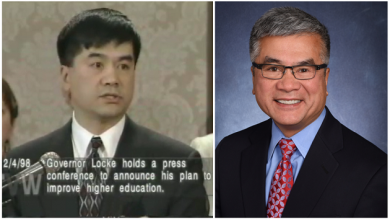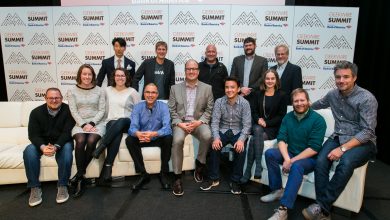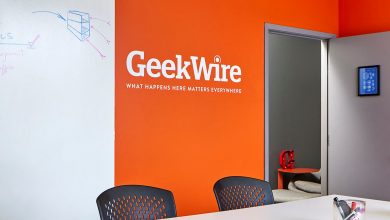Podcast: Tune CEO Peter Hamilton on the future of mobile marketing and lessons from his opera career
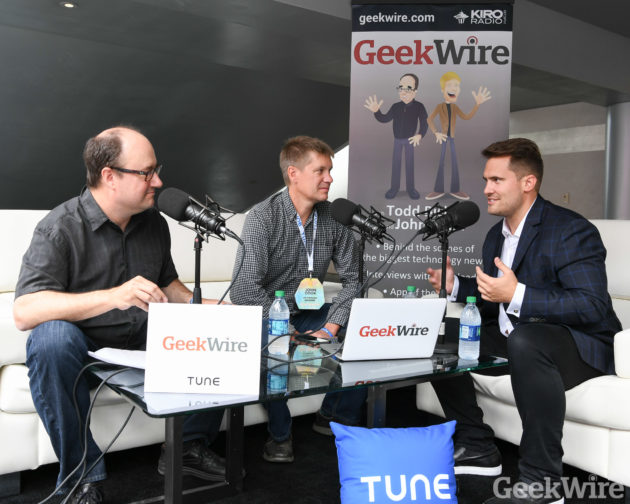
What do mobile marketing and the classic Baz Luhrmann film Moulin Rouge have in common?
Most people would say nothing at all, but Peter Hamilton, CEO of mobile marketing startup Tune and a former professional opera singer, sees plenty of comparisons between the worlds of marketing and musical performance.
We sat down with Hamilton at Tune’s annual Postback conference just after he got off stage from a combined keynote and Moulin-Rouge-inspired number to talk marketing tech, building company culture and, of course, opera.
Hamilton says the world of mobile marketing, as well as Tune’s work, is beginning to reach far beyond the phone and into the physical world and different digital experiences. But while technology is ready to take on things like location-based marketing and chatbots, he says the industry is still struggling with how to use them best.
As for his opera career, Hamilton says the competitive world of performance has really helped him persevere in the startup world as well. Plus, he says marketing also has forms of storytelling and performance that helps keep those creative juices flowing.
Listen to our full conversation with Peter Hamilton below, download the MP3 here, watch the behind-the-scenes video above and keep reading for an edited transcript. Thanks to Tune for sponsoring this GeekWire Podcast at Postback.
Todd Bishop: Tune is, in a nutshell, a provider of technology for marketers, app creators, ad agencies, many other players in the industry, to track and analyze app downloads and usage — and also to understand what users are doing inside of apps. It’s a big area. It gives you a really interesting glimpse into the landscape for mobile marketing, and we’re going to talk about that on the show. But first, I’ve got to ask you about Moulin Rouge. So John, set this up.
John Cook: You’re kinda setting a high bar each year on what you do to kick off the conference. I texted Todd right after your musical performance, and I said, “This is how you kick off an event.” So you came on stage. Explain what happened.
Peter Hamilton: I’ve always loved Moulin Rouge, and especially the finale. That closer where everything goes off, and there’s fireworks, and there’s streamers and crazy stuff happening. I was like, “Man, it’d just be amazing to open up a show doing something like that.” Plus, I really love Ewan McGregor. I’d love to play his part. So this was a way to live out that dream, and also do something really special for the industry.
Cook: Yeah, and we should say, you’re a former opera singer. So you’re no slouch going up there and performing this. In fact, you moved to Seattle to sing in the opera.
Hamilton: That is true. Actually, I moved to be on this stage. I came to sing for Speight Jenkins, early with the Seattle Opera. So 11 years ago, this was one of the first stages I ever sang on. And now Tune gets to use it for a couple of days, so we’re going to use it right.
Cook: I do have a question about the opera and musical performance and singing: What have you learned from the opera that you’ve applied to Tune, or that has helped you grow the company?
Hamilton: Well, I mean in the performance world, it’s pretty brutal, to be honest.
Cook: So are startups.
Hamilton: Yeah, and so are startups in a lot of ways. And you have to be able to accept failure, accept rejection. In fact, you get a lot of that in auditions. You have to be able to push through it, persevere, to know like, “I’m on a track, I know what I’m building, the career that I want to create, the art that I want to make and what I think is gonna make a difference.” So a lot of that resilience and perseverance definitely overlaps.
Then, of course, a lot of storytelling and marketing, connecting to customers — it is a form of performance. It’s a form of creativity. So this is one outlet for doing that. But my entire company is always looking for ways to surprise, delight and connect to customers and marketers.
Bishop: Give us your elevator pitch. You’re very focused on mobile marketing, but you’re getting beyond the phone a little bit. One of the things you talked about on stage today was the importance of in-store analytics. In other words, understanding what users are doing on their phones in the store, how they’re interacting with things. How is the world of mobile marketing changing, and how are you addressing that at Tune?
Hamilton: That’s right. Really we see mobile as sort of a center point, because it is a device that goes around with us everywhere. It’s with us when walk into a store, or when we go home, or when we go to work. So how do we use that to connect to all the other marketing experiences that we might have? Of course, the user has to be open to that. The customer has to say, “Hey, I want to see new things, and I want to learn.” Then, if you have that access, you can really build all kinds of cool things around it.
Cook: This has been talked about forever as it relates to mobile: The idea of location-based services, you’re walking by the Starbucks and you get the coupon that’s sent to your phone. But that’s not really happening with that much regularity. When is that going to start to take off? Are we starting to see more mobile marketing as it relates to location-based services?
Hamilton: I think it comes back down to measuring everything against performance. A lot of these ideas are cool and cute, but they haven’t really shown ROI.
Bishop: Somebody will walk by, they’ll get the alert, and they won’t actually go in and get the cup of coffee?
Hamilton: Either they’re annoyed, or it’s not quite right place, right time, or even if it is, it’s just small-scale. There’s not enough customers to really move the needle and make a major difference. So we have to start thinking a little bit more in a more scaled and more complex way: What are our daily patterns? What are things that we know that can add value to a customer’s life every day, where we can impact, and have these dialogs and these connections? And yeah, it takes some deep thought to get into those things.
We already can provide this sort of messaging on a beacon, or someone comes into a geofence, and we can do a lot of things with that. But we really have to measure what’s happening first, and look at things like in-store analytics, and understand what is the connection between their phone and this in-store experience. And then we can start to build out some real campaigns.
Cook: Snapchat made a big bet on this, buying a Seattle company here recently, Placed, for about $200 million. You know, Snapchat is an interesting company. I’d love to just get your perspective on that, because as they went public — the stock has now fallen back because there’s a lot of doubt on whether they can monetize. You guys are the experts on mobile monetization. What is Snapchat’s path to having a successful revenue-generating business? What would you advise them to do? What’s on their horizon, do you think?
Hamilton: Well first of all, I have to say I love Snap, and I love Placed, and I think it’s an early bet, but I think something that is going to help develop location marketing and how we think about it. When it comes to how Snap is gonna succeed, just as a company, and with their customers — well really with users, with people — I’m more concerned about growing the user base, and making that really, really strong, and seeing that continue to have the right kind of users coming on board that use it a lot, so that you can engage them and monetize them with advertising.
I honestly am not worried about them monetizing their users. I think that was a big worry with Facebook, when they were in a similar timeframe. At that point, Facebook didn’t have the user growth problem, and still had that exponential increase happening — and look, it worked it okay. Facebook figured out how to do some monetization. So I actually think Evan’s (Evan Spiegel, Snap CEO) being pretty smart not going too far too fast, staying focused on the fundamentals of our user base, and the value that we provide, and the connections in this messaging world. And I think if they can continue to solve that and see growth from that, that will lead to success.
Bishop: One of the other things that you showed onstage in your keynote, which you just go out of, was the Tunebot, which is basically a chatbot that leads folks through some of their marketing analytics from the Tune consoles. Do you see that taking off, or is it still more of a novelty, chatbots in general?
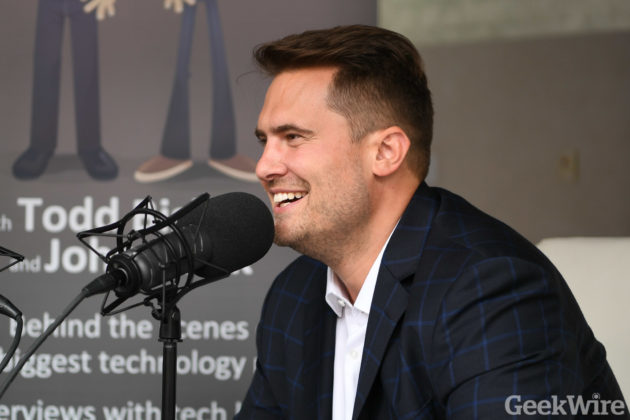
Hamilton: You know, I do think the chatbots will take off a little bit more. We just don’t really know how to interact with them on a regular basis. We don’t immediately think about the robot that can help me. So there has to be more cues and things that hit me automatically, where I can set up, “OK, Tunebot, I want you to tell me things on a regular basis. Oh, you gave me that information, I wonder about this.” I mean, everything in the future of technology is not going to be me asking for things, it’s going to be stuff coming to me. And I’m going to make some decisions based off of that, where I want to dig in further. So we’re building in some of those hooks and schedulers and all of those kinds of things into Tunebot.
But I kind of think about it, you know, when you look at Alexa and Echo, and how we’ve started to interface with those devices. I actually think those are more difficult with speech, in a lot of ways. To get specific about the exact thing that I’m looking for. And that’s the cool thing about chatbots, especially when you’re thinking about an industry like ours, where I need to ask, “What was the return on ad spend for this partner under this campaign over this period of time?” A chatbot, I think, is really, really usable for that.
Bishop: Do you see that happening primarily through Slack, third-party apps, Facebook Messenger? Or do you see that being natively integrated into things like your console?
Hamilton: I do think messaging apps are going to pull most of that together. If that’s the stream, the flow that I’m living in, then why would I move outside of it to talk to a service, or talk to a retailer or whoever it might be? I do think that those things will combine.
Bishop: Peter, what were some of the lyrics in that epic Moulin Rouge performance?
Cook: I wrote one down. Well it started with, “Always knew these clicks were fake.”
Hamilton: That’s right, “Like these installs never even came.”
Bishop: I love how the performance set you up for the rest of the keynote, because one of the things you talked about was some new fraud-prevention technologies that you’re rolling out. How important is that issue?
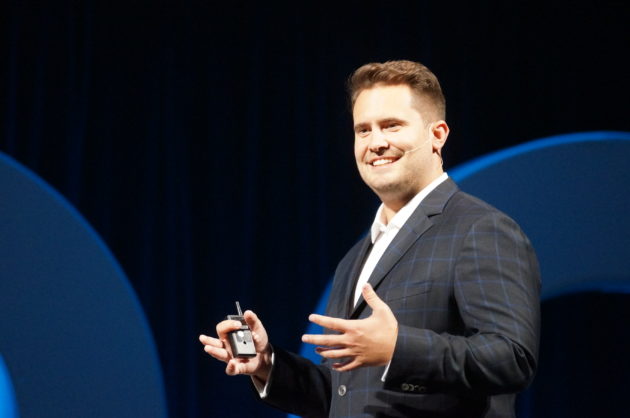
Hamilton: Well it’s a massive issue for marketers that are trying to figure out what is the value of performance of the things that I’m buying. They need to be able to trust partners. They need to be able to quickly make decisions on this.
Bishop: And just to explain this for folks, the idea is they want to know who’s installing their apps, what users are doing in those apps, and why. And it’s the attribution that matters. And if the attribution isn’t clear, or if the attribution is fraudulent, then it’s a problem. That’s what you’re trying to solve.
Hamilton: Yeah, if it looks like I got an install, but it was a botnet — or it was an install that was already organic, that I would have had anyway, that someone else claimed — then I’m paying money for things that I shouldn’t be paying money for. And marketing’s not being judged on performance.
Bishop: One other big technology trend I wanted to ask about, you also touched on this in your keynote, it’s mobile is going beyond the phone, not just to the store, as we talked about earlier, but also to televisions, Apple TV, FireTV. You know, Amazon had an experiment where they tried to have folks, from the FireTV interface, actually order items, and it hasn’t really taken off yet. What role do you see TV, in particular, playing in the world of commerce going forward?
Hamilton: I really see TV as a second screen, just like I see desktop at this point. So being able to be entertained and look for the content that I’m trying to find, and be able to see it in this sort of entertainment viewing-style experience. Certainly there will be some surfing that we can do in that entertainment experience, but the more that we’re connecting that to what’s happening in my handheld device, the more effective it’s going to be. So Apple TV and Chromecast make me excited, because they are provided by manufacturers that create phones and devices that can make the interplay between them a little bit more seamless.
Bishop: Okay. Let’s talk about Tune as a company. How many people are you up to now?
Hamilton: We’re almost 400.
Bishop: And for people who may not know this, it was started originally by two twins, Lucas and Lee Brown.
Hamilton: Yep, identical.
Bishop: I cannot tell them apart. Can you?
Hamilton: Well the thing is, sometimes they switch their beards, and they switch their haircut, and I’m like, “Guys, come on, you don’t have to do that.”
Bishop: They have embarked on a fascinating experiment involving Alaska. Can you explain this story to people who aren’t familiar with it?
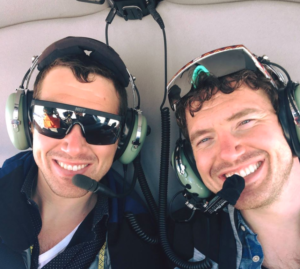
Hamilton: So really the way it started is Lee, one of the twins, just fell in love with Alaska. He spent some time up there, and he fell in love with the adventure that it brings, the wide-open spaces, the opportunity, and he also saw what is really a pretty sad economic situation. So he was thinking — I mean, I work in an internet business, I don’t have to be in a big city. How can we start to explore ways to integrate a life that is filled with this adventure, and filled with this great expanse of the outdoors, and also allows me to connect into technology, to build things, create things?
Lee is one of our leaders of our R&D department today, and he’s cranking out nine, ten hours of code still, a day. And he’s doing it in Alaska. And half the time, he’s doing it in a tent. It’s really fun to watch someone who’s that driven and excited about the adventure that it brings, and it’s become contagious. So we have engineers that are coming up to visit, and spending time — spending like a week of hackathon-ing and growing products up there together. And then, a couple of weeks ago, we had a larger-scale event, where we brought up a lot of folks from the company over the 4th of July week. And we really got to share some of this vision with them.
Cook: I think I saw photos of you on a paddleboard or something out in glacial-fed waters.
Hamilton: It almost seems like private lake, because there’s no one there. It’s insane.
Cook: I’m interested in about how you adapt the culture of the company with one of the leaders in Alaska, and the bulk of the company in Seattle. What has that done to the culture of the company? How do you bring people together around this kind of bizarre idea?
Hamilton: I think you’ve got to have accountability with each other. So that piece can’t be broken. But outside of that, we just want to show people we’re open. We’re open to exploring and thinking more. We’ve increased our work from home policies with engineers to start exploring more with that. We actually started with, “Okay, you can do one day a week. Let’s see what happens to productivity. Okay, now you’re allowed to do two days a week.” We wanted to see what really impacts our productivity on sprints and delivery dates and all those kinds of things. And it turns out, engineers need peace and quiet. They need time to set themselves and stay focused on a product. And integrating a beautiful place or a home environment or something else actually can be extremely valuable and productive.
Cook: So you’re in the mobile app business. What’s on your phone? What are the apps that you’re using the most right now?
Hamilton: Oh man. I travel a lot, so I’m using lots of travel apps. I’m definitely using Delta, definitely using Uber, using all those kinds of things. I’m playing a new dice game that’s pretty cool.
Cook: What is it?
Hamilton: Yeah, let me show it to you. So this is actually a long-time Tune customer that has joined up with some other folks to make Dice Smash.
Cook: Dice Smash, okay.
Hamilton: Yeah, so it’s sort of a connect dice across, and it’s got a lot of fun little quirky things that happen in it. The opening page says, “Super Happy Fun Time,” so it’s gotta be.
Bishop: Well as you look at Tune and look ahead to the year ahead in 2017, think about your culture and what’s going on in the marketplace, in particular, what’s top of your agenda right now as CEO of Tune?
Hamilton: Well you know, we’ve gotten to a size and scale now that you have to think about: Who’s gonna be your most important customer? How are you gonna think about growth of the company, both from a financial perspective and from a human perspective, and what’s that gonna lead to? In the first place, when we talk about customer, certainly we’re working with more and more enterprise customers. That means that we have to go much deeper into organizations. We have to connect more features and more pieces of technology together for those organizations. Rather than spreading ourselves out across just a large number of companies, our focus is to go deep, and to get really connected to our customer. So that’s definitely a target for us.
When it comes to financial success, I care most about predictability. Obviously that’s better for customers also, if they can predict what their bill is going to be on a monthly basis, and they can understand how that’s gonna change over time. But it is also really valuable for us as a company, as we start thinking toward maybe moving into a public offering, or moving into something that I’m gonna have to report on these numbers every quarter and make damn sure that we’re gonna land them. So that’s gonna be a big focus for us.
Cook: IPO in the cards? Acquisition in the cards? Who’s talking to you?
Bishop: Yeah we just had the example of Redfin.
Hamilton: They’re all in the cards. I mean, that’s the reality, right? As an entrepreneur or a CEO, especially at a company this size, you have to keep your options open. You have to be available. But in the meantime, you’ve got to build a great business. You’ve got to be profitable.
Conclusion: So above is the Podcast: Tune CEO Peter Hamilton on the future of mobile marketing and lessons from his opera career article. Hopefully with this article you can help you in life, always follow and read our good articles on the website: Ngoinhanho101.com

